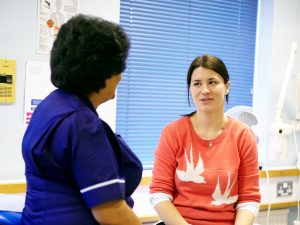Cancer referral in younger patients – do age threshold guidelines need updating?
Start Date Sep 2020
Code L8-C
Status Ongoing
The risk of cancer increases with age and some symptoms are less likely to be cancer if the patient is young. Therefore, GPs guidelines often take a patient’s age into account to decide whether they need an urgent referral for cancer tests or investigations. As a result, younger cancer patients are more likely than older ones to have to visit their GP several times before being referred.
There is evidence that some cancers are becoming more frequent in the younger, possibly due to risk factors, such as obesity, being more common today than in the past. If patients are developing cancer at a younger age, the age limits in GP’s referral guidelines may need reviewing to prevent an increasing number of patients facing a delay in diagnosis during which their cancer could progress to a less curable stage.
Aims & objectives
– To understand what factors influence GP’s interpretation and implementation of age-threshold guidelines;
– To determine for which cancers there is clear evidence of an increased incidence in younger people;
– For these cancers, to examine the diagnostic journey of younger patients compared to older ones.
Methodology
This project is articulated into 4 workstreams:
1. A literature review of the evidence for an increase incidence of cancer in younger people, focussing on 12 cancers that have an age threshold for investigation in the NICE guidelines (Colorectal, Bladder, Lung, Oesophagus, Pancreas, Stomach, Breast, Ovarian, Endometrial, Renal and Laryngeal cancer and Myeloma);
2. An evidence review of the studies underpinning the age threshold for investigation of colorectal cancer;
3. An analysis of diagnostic data included in the NCDA dataset to explore the diagnostic journey of ‘younger’ patients compared to ‘older’ patients;
4. A qualitative study using semi-structured interviews to determine if, when and how GPs refer patients below the age threshold and what factors influence these decisions.
Outputs & impact
This project is expected to yield a minimum of 5 publications. The evidence gathered in this project may inform specific changes in the cancer diagnostic pathways for younger people, empowering GPs to make more personalized and patient-centred decisions.
Next steps
Based on the findings from this project, we will seek further support from relevant funding bodies to investigate whether specific diagnostic tools/tests could be used to triage patients with cancer symptoms who are below age-referral threshold and identify those more likely to benefit from urgent referral.
Publications
- di Martino E, Smith L, Bradley SH, Hemphill S, Wright J, Renzi C, Bergin R, Emery J, Neal RD. Incidence trends for twelve cancers in younger adults—a rapid review. Br J Cancer (2022). doi: 10.1038/s41416-022-01704-x



